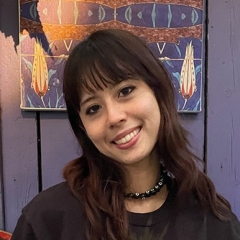Anthropology (BA)
Why study Anthropology?
As an anthropologist, you study what it means to become a person in Canada and around the world. By systematically observing and investigating cultural life in diverse human societies, you’ll understand the ways in which much of what we assume to be natural is, in fact, constructed by our culture.
Once you discover that family, art, politics or economics take many possible forms, your notion of what it means to be a person expands and grows. Through our courses, you’ll examine the self and identity, look at large-scale research projects across cultures, and apply our methods to nearly any place — from Africa to the Middle East, or the Caribbean — to nearly any topic from medicine to gender, or myth.
We’re known for encouraging our students to participate in local, national, and international research. You'll work on your own projects, and have the opportunity to work on faculty research. Anthropology teaches you critical skills that equip you to make informed decisions in any profession.
Program highlights
- Gain hands-on research experience in community settings
- Study anthropology through the lens of sustainability and global transitions
Special funding for out-of-province students
Up to $4000 for undergraduate programs.
Program structure
A Bachelor of Arts degree takes a minimum of three or four years (90 – 120 credits) of full-time study, depending on your academic background.
Program options
- Honours in Anthropology (60 credits)*
- Specialization in Anthropology (60 credits)
- Major in Anthropology (42 credits)
- Minor in Anthropology (30 credits)
*Honours is a highly concentrated program, ideal for students planning to continue to graduate studies. If you are interested in Honours, speak with your program advisor in your first year of study at Concordia. Students applying to the University are able to apply to the major or specialization.
Courses
Co-op program
The Co-op program gives academically strong students a chance to bridge university life and the working world by completing paid work terms. Co-op students graduate with job-search skills, enhanced personal and professional skills as well as a year’s worth of work experience. Your work may include:
- Community and social engagement
- Sustainability programs
- Development projects, execution and evaluation of social economy/community
United States students: A U.S. Federal Student Aid-eligible version of this program is offered. This version meets all U.S. regulations (such as no co-operative education or e-courses) for eligible programs.
Admission criteria
Minimum cut-off averages and course requirements
- Quebec CEGEP: 22
- High School: B-
- ACT or SAT is NOT required
- Canadian curricula course requirements
- Accepted international qualifications
- International Baccalaureate (IB) diploma: 27
- International Baccalaureate Career-related Programme (CP): 4.5/7
- Baccalauréat français: 12
- British system of education (GCE):
- A-levels: At least two A-level exams CD or
- AS-levels: At least 4 AS-level exams with equivalent results or
- BTEC: Level 3 Diploma or Extended Diploma in a related subject area with equivalent results
- Additional information for British System of Education (GCE) applicants
- University Transfers (internal/external): B-
Minimum cut-off averages should be used as indicators. The cut-off data may change depending on the applicant pool. Applicants who meet the stated minimum requirements are not guaranteed admission to these programs.
Application deadlines

FALL ENTRY (September)
Deadline: March 1
U.S. and international applicants: Apply no later than February 1 to allow time for immigration document processing. However, applying earlier is strongly recommended. Immigration processing times vary by country and delays could prevent you from starting your studies on time.

WINTER ENTRY (January)
Deadline: November 1
U.S. and international applicants: Apply no later than August 1 to allow time for immigration document processing. However, applying earlier is strongly recommended. Immigration processing times vary by country and delays could prevent you from starting your studies on time.
We reserve the right to close admission to a program at any time after the official deadline without prior notice.
After your degree
Because social science forms the backbone of so much of today’s work, both public and private, the fundamental skills you learn in our program will equip you to make structured and informed decisions, in any profession, including:
- Market research
- Urban planning
- Regional or overseas development programs
- Private sector social research agencies
Student story

Chloe Marchal
Honours in Anthropology
Major in Intermedia (Video, Performance and Electronic Arts)
Concordia is good at giving you opportunities for non-traditional learning that’s not just being in the classroom.
Other programs of interest

As an anthropologist, you study what it means to become a person in Canada and around the world. By systematically observing and investigating cultural life in diverse human societies, you’ll understand that much of what we assume to be natural is, in fact, constructed by our culture.
Department
Department of Sociology & Anthropology
Faculty

Modern scientific psychology studies brain processes and behaviour — both human and animal — under various conditions.
Department
Faculty

As sociologists, we look at how societies are constituted in Canada and across cultures.
Department
Department of Sociology & Anthropology
Faculty

